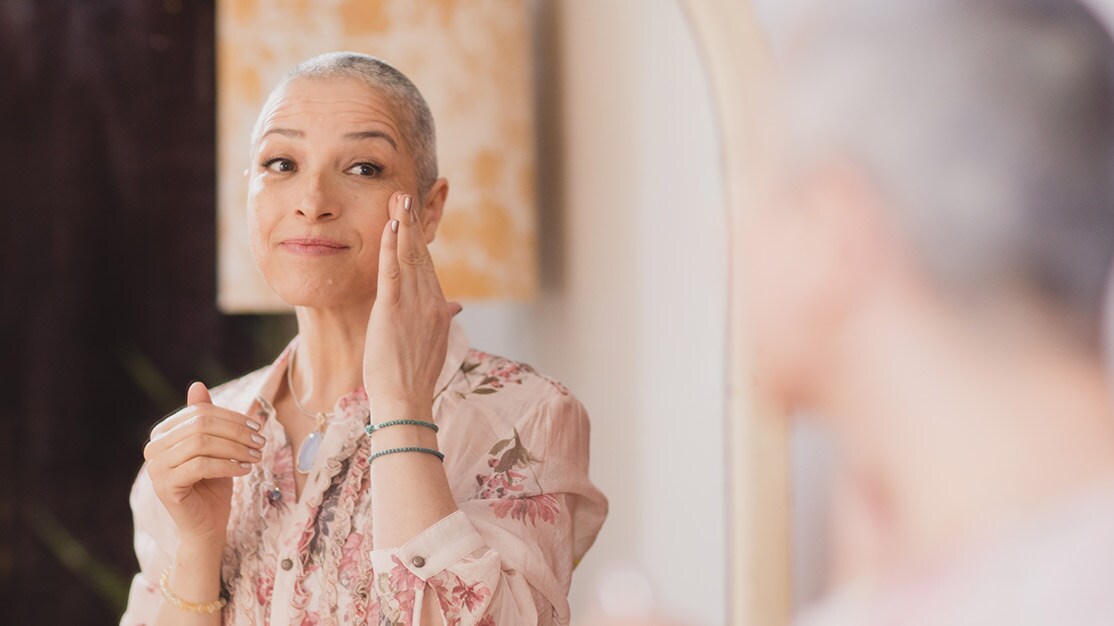Myths About Skin Care with Cancer

Cancer treatments, including chemotherapy and radiation therapy, can cause changes to your skin both during and after treatment.
Learn how your skin can be affected by cancer treatments, including the truth behind some common myths.
Myth: I can care for my skin the same way I did before I received cancer treatment.
Fact: Cancer treatments can cause many skin changes, such as dryness, redness, rashes and acne. Due to these effects, you may need to overhaul your skin care routine. For instance, chemotherapy can reduce how much oil your glands secrete, which can lead to dry and dehydrated skin. For dry skin relief, cleanse your skin with lukewarm water and mild, fragrance-free soap or cleansing lotion, and pat, rather than rub, dry. Then apply a moisturizer, in the form of a cream or ointment instead of a lotion, while your skin is still damp. To help keep your skin from drying out, avoid hot showers and baths.
In addition, chemotherapy, surgery or other cancer treatments can cause some women to start menopause early, which can possibly lead to thinning skin and loss of skin elasticity. Radiation can cause skin irritation, burning, peeling, itchiness and temporary pigment changes. Let your oncology health care team know about any skin changes you have, especially if you develop a rash or skin reaction.
Myth: I can continue using my current skin care products during cancer treatment.
Fact: It’s important to tell your health care team about all products you use. In some cases, they may ask to avoid using certain products or ingredients. What’s more, there may be some products you use now that can interfere with your treatment. Certain creams, lotions and cosmetics may leave a coating on your skin that can affect radiation.
Myth: I must completely avoid the sun after cancer treatment.
Fact: Chemotherapy can make your skin more sensitive to the sun, causing skin to burn more quickly and easily. Likewise, areas of your skin that receive radiation therapy will also be extra sensitive to the sun for the first year after treatment. However, unless your health care provider says otherwise, this doesn’t mean you have to stay out of the sun. Rather, you’ll just have to be diligent about protecting your skin from the sun. Use a sunscreen with a sun protection factor (SPF) of 30 or higher, wear protective clothing, such as a wide-brimmed hat, cover up surgical scars and seek shade during mid-day, when the sun is strongest.
Caring for your skin from the start of cancer treatment can help reduce or ward off skin changes. Plus, taking good care of your skin can help you to feel more like yourself. Ask your oncology health care team the best ways to care for your skin. At select Walgreens locations, pharmacists and beauty consultants are available to help you manage the physical changes associated with cancer. As part of the Feel More Like You ™ program, these specially-trained pharmacists and beauty consultants understand that cancer treatments can affect how you look and feel, and they can offer advice to help you feel more like yourself.
Reviewed May 13, 2021
Sources:
“How to care for your skin after cancer treatment,” Dana-Farber Cancer Institute. Web. 11 May 2021. https://blog.dana-farber.org/insight/2015/08/how-to-care-for-your-skin-after-cancer-treatment/
"Caring for your skin during and after cancer treatment," Memorial Sloan Kettering Cancer Center. Web. 11 May 2021. https://www.mskcc.org/blog/caring-your-skin-during-and-after-treatment
“Skin sensitivity,” Breastcancer.org. Web. 11 May 2021. https://www.breastcancer.org/tips/hair_skin_nails/skin_care
“How to care for your facial skin,” Cancer Research UK. Web. 11 May 2021. https://www.cancerresearchuk.org/about-cancer/coping/physically/changes-appearance/skin-care-makeup/caring-for-your-facial-skin
“Caring for your skin, hair, and nails during chemotherapy,” WebMD. Web. 11 May 2021. https://www.webmd.com/cancer/features/appearance-during-chemo#4
“Summer skin care,” Breastcancer.org. Web. 11 May 2021. https://www.breastcancer.org/tips/seasonal/skin_care
“Chemo and sun sensitivity: How to protect your skin,” UVAHealth. Web. 11 May 2021. https://blog.uvahealth.com/2019/07/21/chemo-and-sun-sensitivity-how-to-protect-your-skin/#:~:text=While%20long%2Dterm%20exposure%20to,known%20as%20drug%2Dinduced%20photosensitivity